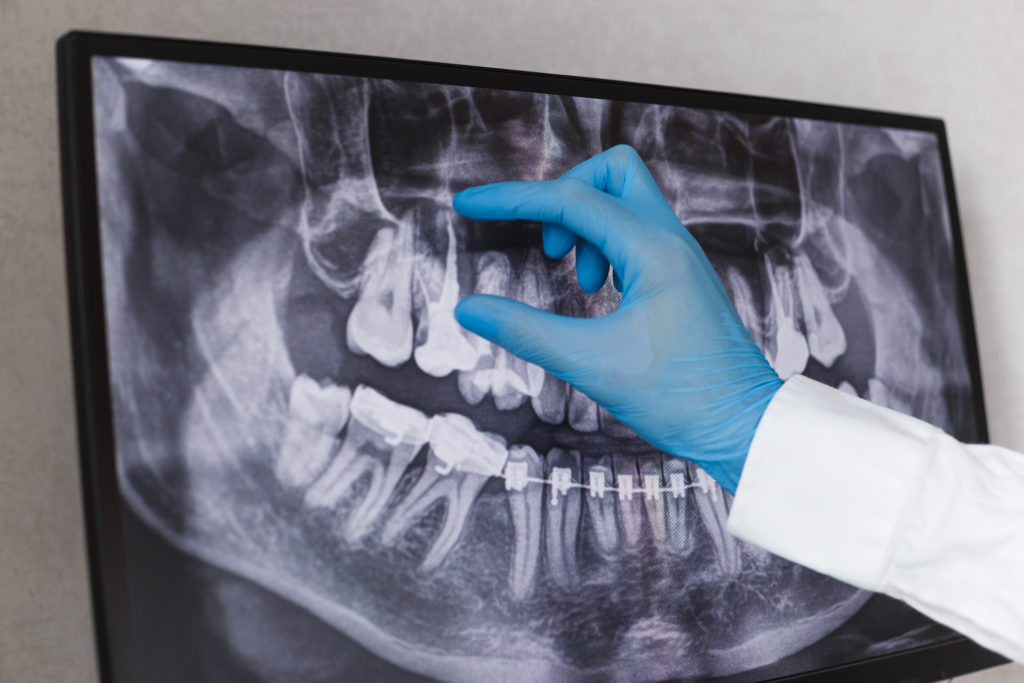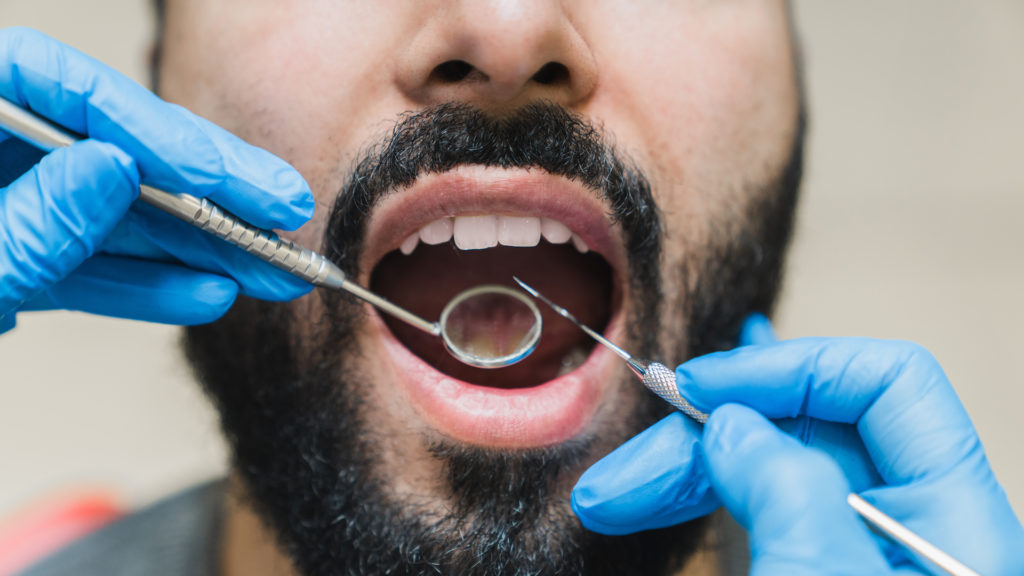Cavities are one of the most common dental conditions in children, teens, and adults. In most cases, cavities are generally easy to treat with simple dental fillings or crowns — if they're caught in time. While it can take some time for early tooth decay to develop into a full-blown cavity, many dentists prefer that patients treat their cavities as soon as possible vs. leaving them untreated.
If you have symptoms of a cavity and you're wondering exactly how long is too long to let it go untreated, this blog post is for you! Below, you'll learn more about cavity causes, symptoms, and their overall timelines.
What Is a Cavity?
Cavities are areas of tooth decay that develop on the teeth's chewing surfaces, roots, and around dental restorations such as fillings and crowns. Tooth decay occurs when sticky plaque releases acids that erode the tooth enamel. When the sugars in the foods you eat and beverages you drink mix with the bacteria that are naturally present in your mouth, plaque can form and stick to the tooth surfaces. Over time, the acids in the plaque can damage your tooth enamel to the point where a cavity develops.
How Do You Know If You Have a Cavity?
While a common belief is that cavities are black or brown, did you know that they actually start off as white spots? Referred to as early decay, these white spots are the first sign of a pending cavity. If you notice white spots or flecks on your teeth, the good news is that this type of tooth decay can often be reversed with fluoride toothpaste and fluoride treatments.
Aside from white specks that are often so mild they go unnoticed, you might not notice any signs of a cavity in its early stages. New cavities don't usually cause any painful or uncomfortable symptoms but as they progress, you may experience tooth sensitivity or pain when biting down. You may also notice the telltale dark spots or streaks on your tooth surfaces that don't come off when you brush your teeth.
What Happens If You Don’t Treat a Cavity?
One of the most important facts about cavities is that they don't go away on their own. Even if you have a slow-growing cavity, it should be treated at some point to prevent the decay from spreading. As a cavity spreads, it affects a larger portion of the tooth. This can make it difficult to treat with a standard dental filling.
In addition to forming a large cavity, progressing tooth decay can make its way deep into the tooth and expose the tooth roots. This can be extremely painful and increase the risk of infection. In some cases, untreated cavities can cause the tooth pulp to become severely inflamed or infected.

How Long Can You Delay Treatment on a Cavity Still in the Enamel?
In some cases, early signs of tooth erosion in the enamel can be successfully treated with fluoride toothpaste or surface filling materials. But once an actual cavity forms, dentists usually recommend treating it within a year. It's also important to note that timelines can vary depending on your specific dental needs. Some people have softer enamel than others, which can cause cavities to progress rapidly.
As a cavity grows, it can move from the enamel into the deeper tooth layers and eventually make its way into the pulp. The best way to determine how long you can delay treatment on an enamel cavity is to schedule a dental exam. Your dentist will take X-rays to check the size and progression of your cavity. If they feel you can wait before treatment, they'll give you an exact timeline.
How Long Can You Delay Treatment on a Cavity That Is in the Dentin?
Once a cavity begins to form in the dentin, it's important to treat it as soon as possible. The exact length of time between cavity formation in the dentin until it reaches the tooth roots can vary but this can sometimes happen in as little as 3 months. It's always best to follow the advice of your dentist when it comes to delaying treatment. They may recommend a "watch and wait" approach if the cavity has just started to form or they might suggest immediate treatment if they detect that your cavity is rapidly progressing.
How Long Can You Delay Treatment on a Cavity in the Pulp?
If your dentist diagnoses a cavity in the dental pulp, the sooner you receive treatment, the better! Pulp cavities usually require root canal treatment to prevent further damage to the tooth. During a root canal procedure, a dentist or dental specialist uses specialized tools to remove bacteria, decay, and damaged tissues from the inside of the tooth. Once the tooth is cleaned and treated, a large filling or crown is placed over the remaining tooth structure.
Causes of Cavities
Cavities develop when plaque forms on the teeth and releases acids that can eat away at the tooth enamel. The bacteria naturally present in your mouth feed on the sugars in the foods and beverages you consume, and the end result is dental plaque. Plaque is sticky, which makes it easier to adhere to tooth surfaces.
Over time, plaque releases acids that cause demineralization, also known as tooth decay. As the tooth decay progresses, the acids eat through the deeper enamel layers, causing cavities. Plaque can be very stubborn, which is why brushing at least twice a day and after meals is so important. Brushing your teeth with fluoride toothpaste can help neutralize plaque and plaque acids and lower your risk of developing cavities.

How Are Cavities Treated by Dentists?
During a cavity treatment procedure, the dentist uses a drill or other specialized dental tool to remove the decayed areas. Once the "cavity" portion of the tooth is effectively removed, the dentist fills the empty space with a metal or composite filling. For deep cavities in which a large portion of the tooth is removed, your dentist may recommend placing a dental crown to ensure the tooth surface is strong enough to withstand chewing and clenching pressure.
If you're scheduled for cavity treatment and you're worried about pain, don't be! In most cases, filling procedures aren't painful. You may feel a slight pinch when the dentist numbs your gums and the drilling can feel a little strange. Still, you shouldn't feel any pain once you're all numbed up.
If you've got a toothache or you're concerned about a potential cavity, our teammates at Risas Dental are standing by and ready to assist! We offer affordable dental care with easy payment options for all budgets and credit types. Book an appointment today.
Frequently Asked Questions
Some common dental emergencies include cracked or broken teeth, abscessed teeth, severe jaw pain, soft tissue injuries, and heavily bleeding gums. Similar to medical emergencies, a dental emergency is any situation that requires immediate treatment.
One of the most common signs of a cavity that's reached the root is throbbing pain in the affected area. You may feel pain or pressure when chewing, or your tooth might be sensitive to hot and cold. Tender, swollen gums surrounding the affected tooth are another common symptom of root cavities.
When you go for your checkup at the dentist, one of the last things you want to hear is the words "root canal." Treating a root canal isn't very fun. After all, it takes some time and causes a bit of discomfort. Still, it's essential: ignoring a root canal issue can cause the problem to spread to other areas of the mouth, leading to serious dental problems and even other potential health problems. So, how do you know if you need a root canal? Find out the seven common warning signs that root canal therapy is in your future.
What Is a Root Canal?
First, it's important to understand what a root canal is. A root canal is a type of endodontic treatment — a treatment that works on the inside of the tooth. A root canal treatment aims to repair an extremely damaged or infected tooth in the hopes of avoiding tooth removal. The treatment is called a root "canal" because the process includes cleaning out inside the canals of the roots of the tooth.
A root canal is a fairly straightforward procedure. Your dentist will extract all the bacteria from the tooth pulp, nerve, and root. Then, the area is disinfected with antibiotics and the empty roots are filled. The last step is to close the area to prevent new decay.
What Parts of the Tooth Are Involved in a Root Canal?
The root canal focuses on the inside of the tooth. With this procedure, the damaged or infected tooth pulp from inside the crown and roots of the tooth is cleaned. After the cleaning, the canal is disinfected, filled, and sealed.

7 Signs You Need a Root Canal
Here are the seven most common signs that you may need a root canal.
- Persistent Pain
Your teeth shouldn't cause you constant pain. If you're finding that you're continuously in pain or the pain frequently bothers you, stops, and then returns, it could be a sign you need a root canal. Persistent pain can be due to a damaged root in your tooth.
Of course, persistent pain can also be due to other dental problems such as a cavity or a damaged filling. To address your tooth pain, see a dentist immediately — after all, no one wants to live with pain!
- Chipped or Cracked Teeth
When you chip or crack a tooth, it becomes more at risk for a root canal. The tooth is now "open," and bacteria can easily access the inside of the tooth, which can result in an infection. Alternatively, the tooth may have chipped or cracked in the first place because it's infected or decayed, which left it weak. Regardless, it's always a good idea to get a chipped or cracked tooth checked out by a dentist.
- Sensitivity to Heat and Cold
Believe it or not, your teeth aren't supposed to shock you with pain when you eat something cold or hot. If this happens, it could be a sign that the nerves in your teeth are damaged or infected. When your tooth's pulp chamber is infected, the nerves in the pulp chamber can overreact to heat or cold. Overreaction causes a sharp or dull pain that often lingers.
- Swollen Gums
Your gums are often a great indicator of your overall oral health. Healthy gums are firm and pink. If you notice a painful tooth has swollen gums surrounding it, this could mean you need a root canal. The swelling occurs from the acidic waste products of dead pulp tissues, and a root canal can help treat the tooth and decrease swelling in the gums.
- Tooth Discoloration
If the pulp of your tooth becomes infected, it can sometimes lead to your tooth turning a grayish-black color. A lack of blood supply to the tooth pulp can result in the breakdown of internal tissue, which might then be followed by discoloration.
Tooth discoloration doesn't always require a root canal and can instead be due to another dental problem. Regardless, you shouldn't ignore discolored teeth.
- Tooth Mobility
Tooth mobility is the medical term for a loose tooth. When a nerve is damaged, it can cause a tooth to become dislodged and feel looser. There are other reasons for tooth mobility, but root canal therapy may be necessary if you have a loose tooth.
- Deep Decay
Letting a cavity go for a long time without treatment can result in deep decay. Deep decay is when an infection has set so far into the tooth that regular oral hygiene care, or brushing and flossing, can't help. Once deep decay has set in, a root canal is often the only solution before the tooth has to be fitted with a crown.
Does a Root Canal Hurt?
Thanks to advances in modern medicine, root canals are often painless for patients. A dentist can use a combination of anesthetics and modern dental techniques, making the procedure as pain-free as possible. Patients might experience some discomfort in the tooth area for a few days post-treatment but over-the-counter pain medication can help.
Don't ignore the warning signs. If you think you might need a root canal, we recommend scheduling an appointment at one of our convenient locations.
FAQs
If you have mild symptoms, such as some slight tooth pain or sensitivity, it could mean that you just need a filling. But if you have moderate to extreme symptoms, such as tooth
discoloration, persistent tooth pain, or a loose tooth, it's far more likely you'll need a root canal. Ultimately, only a professional dentist can confirm what kind of treatment you need.
If you need a root canal, the only alternative is removing the infected tooth. According to the American Association of Endodontists, this isn't the best approach. Whenever possible, it's always best to try to save the natural tooth as an artificial tooth cannot fully replace the look or function of a natural tooth.
You might be nervous about your root canal therapy but rest assured, this is a straightforward procedure that your dentist performs regularly. There's little you need to or should do before your root canal. However, make sure you ask your dentist any questions you have so you know what to expect during and after the procedure.
No, an infected, damaged, or dying tooth cannot repair itself. Over time, the tooth will only worsen without treatment and can even spread damage to surrounding areas. Even if someone doesn't feel pain, an infected tooth should always get treated.
A root canal procedure can be performed by a regular dentist. In some cases, a more complicated case will need to be performed by an endodontist. An endodontist is a highly skilled dentist specializing in tooth pain and root canal procedures.
If an experienced dentist performs the root canal correctly, the results can last a lifetime.
While loose teeth in children occur naturally unless they're caused by an accident, a loose tooth in an adult often indicates a deeper issue that should be addressed as soon as possible. Gum disease, stress-induced tooth clenching, underlying medical conditions, and even medications can all contribute to loose teeth in adults.
If you've got a loose permanent tooth, it's important to schedule a dental checkup right away. A professional dentist can correctly diagnose the underlying cause and advise on the best treatment options to help prevent permanent tooth loss. We've also created this informative article to help you learn more about the common causes of loose teeth in adults and how dentists treat the condition.
What Does a Loose Tooth Feel Like?
A loose adult tooth feels similar to a loose baby tooth. When you touch the tooth with your tongue, it could feel wiggly or wobbly. You might also feel pressure or pain when biting down or brushing your teeth. Loose adult teeth can also cause inflamed, painful gums that bleed easily. If your loose tooth is caused by an impact injury, it might appear angled in the tooth socket or feel like it's turned around when you touch it with your finger or tongue.
What Causes Loose Teeth in Adults?
Loose teeth in adults have many different causes. In many cases, treating the underlying issues and practicing good oral hygiene can help tighten the teeth and prevent permanent tooth loss. Visiting your dentist at the first sign of a loose tooth or loose teeth is an important step in saving your smile! Here are some of the most common causes of loose teeth in adults.
Undiagnosed Gum Disease
Gingivitis is a type of gum disease that causes puffy, inflamed gums that may bleed when you brush or floss. Periodontitis is a severe form of gum disease that develops below the gum line when plaque hardens into tartar. In addition to inflamed or bleeding gums, periodontitis can also cause loose teeth. This is because the hardened tartar releases toxins that can break down the gum tissues and bone if the condition goes undiagnosed or untreated.
Changes in Bone Structure Due to Disease
Diabetes, hypertension, Crohn's disease, and rheumatoid arthritis are medical conditions that can increase your risk of developing periodontitis. Once periodontitis sets in, it can lead to bone loss in the jaw and changes in the jaw bone structure if left untreated.
Diabetes causes bone loss throughout the body, including the jaw, while immune disorders such as Crohn's disease and rheumatoid arthritis can lower your natural immunity and cause inflammation of the gums and oral tissues. People with hypertension or high blood pressure lose higher-than-normal amounts of calcium through their urine, which can lead to weakened bones and bone loss in the jaw.
Changes Due to Pregnancy
If you've ever heard the old wives' tale "gain a child, lose a tooth," it actually holds some truth! Studies show the natural hormonal fluctuations that occur in pregnancy can cause the gums to overreact to dental plaque and cause inflammation and bleeding.
The good news? Pregnancy gingivitis is usually temporary. With proper treatment, symptoms tend to clear up after the baby is born and the hormones reset. The not-so-good news? If left untreated, pregnancy gingivitis can increase your risk for periodontitis and loss of teeth. If you're pregnant or plan on becoming pregnant, it's important to talk to your dentist about your unique dental needs during this time.
Injury
Facial injuries caused by falls, accidents, and sudden impacts can cause tooth luxation, a condition in which the tooth becomes loose or angled in the socket. In addition to a loose tooth, symptoms of tooth luxation can include bleeding gums, tender gums, sensitive teeth, and localized tooth pain. The injured person might also hear a high-pitched sound when they tap on the tooth. If your tooth becomes loose due to an injury, it's important to schedule an emergency dental appointment as soon as possible.
Osteoporosis
Sometimes referred to as a "silent" disease because it doesn't usually cause symptoms until you break a bone, osteoporosis is a condition that causes decreased bone mass. Osteoporosis can develop at any age, but it's most common in older men and postmenopausal women. People with osteoporosis develop brittle bones that can easily fracture. When the jaw bones are weakened by osteoporosis, it can result in loose teeth and possible tooth loss.
Teeth Grinding
Bruxism, or teeth grinding, is a condition that causes people to grind their teeth during sleep or unconsciously when they're awake. The specific cause of teeth grinding and clenching isn't fully understood, but medical professionals believe that it may be linked to issues such as excessive stress, anxiety, and snoring. Smoking and caffeine intake may also trigger bruxism episodes. Over time, the constant pressure on the teeth and ligaments in the mouth can contribute to loose teeth, especially for people with existing dental conditions such as tooth decay or gum disease.
Medications
Medications don't directly cause loose teeth, but taking certain medicines may increase your risk for dental disease. When dental diseases go untreated, loose teeth and permanent tooth loss can occur. Antihistamines, antidepressants, blood pressure medications, and diuretics contain ingredients that can cause fluid loss and dry mouth symptoms. A dry mouth creates the perfect breeding ground for harmful bacteria to multiply, and bacteria contribute to gum disease and tooth decay.

Treatment Options for an Adult Loose Tooth
Treatment options for adult loose teeth include splinting, bite adjustment procedures, and deep cleaning and scaling.
Splinting is a procedure that's most often used on loose teeth caused by injuries. During a splinting procedure, the dentist bonds the loose tooth to its neighboring teeth with a metal splint. This helps stabilize the loose tooth as the surrounding tissues and ligaments heal.
Bite adjustment procedures are recommended for patients with loose teeth caused by teeth grinding and bruxism. When a dentist performs a bite adjustment procedure, they use a specialized tool to reshape the biting surface of the tooth. This greatly reduces the pressure caused by grinding and clenching and allows the loose tooth and ligaments to heal.
For patients with loose teeth due to periodontitis, deep cleaning, and root scaling procedures help remove tartar from below the gum line. The dentist uses a scaling tool to break up hardened tartar and calculus on the teeth and the tooth roots. Once the tartar is removed, the gums are allowed to heal and tighten, which can help reverse loose teeth.
Loose Tooth Prevention for Adults
While a loose tooth caused by an injury or accident can't always be prevented, taking proactive steps with your dental health may help prevent loose teeth due to dental disease. Here are some tips on how to prevent loose permanent teeth:
- Schedule regular dental visits. Scheduling regular dental visits that include checkups and cleanings is an important step in preventing tooth loss. Regular cleanings help keep your teeth and gums healthy by removing tartar buildup and plaque. Periodic checkups allow for early detection of issues, such as gingivitis and periodontal disease, that can contribute to loose teeth.
- Wear a mouthguard or splint. If you have bruxism or clench your teeth, your dentist may recommend wearing a mouthguard or splint when you sleep. These devices work by separating the teeth and providing a cushion when you grind or clench. This helps reduce pressure on your periodontal ligaments and may prevent loose teeth.
- Rinse with hydrating mouthwash. Rinsing with a hydrating mouthwash is a good way to reduce bacteria in your mouth and encourage saliva production, which can lower your risk of developing gum disease. If you suffer from dry mouth, be sure to use alcohol-free mouthwash as alcohol can increase dryness and irritate the gum tissues.
If you have symptoms of a loose tooth, Risas Dental can help. Our comprehensive dental services are affordable, and we offer payment plans and financing for all budget types, with no credit check required. We understand a loose tooth can be a little scary, even for adults, but there's no need to worry. At Risas Dental, we "speak patient" — our teammates will guide you through every step of your procedure and keep you informed at all times. Schedule an appointment today!
Frequently Asked Questions
While it's normal for children to have loose teeth, slightly loose permanent teeth usually indicate an underlying dental condition or injury. Loose teeth in adults should always be examined and treated by a professional dentist to prevent complications.
Hormonal changes that occur in pregnancy and during menstruation can sometimes cause temporary loose teeth. This is because the fluctuating hormones can loosen the ligaments that surround the teeth, and the gums retighten once the hormones balance out. Facial injuries, teeth grinding and gum infections can also cause temporary loose teeth.
Rinsing with saltwater can sometimes help soothe swollen gums and flush bacteria out of the mouth, but it can't tighten loose teeth that are caused by dental disease or injuries. If you have symptoms of a loose tooth, it's always best to contact your dentist immediately to ensure you receive the correct treatment.
Cavities can cause serious dental problems without treatment. Understanding the signs of cavities and going to the dentist right away can help you avoid health complications. In this guide, we discuss why cavities occur, explore the symptoms, and talk about prevention and treatment.
What Is a Cavity?
Cavities occur when sugar and leftover food particles interact with saliva. This creates an acidic substance called plaque that sticks to the teeth and erodes the tooth enamel. Eventually, you'll have a small hole called a cavity. If you don't get the cavity filled, the nerves and blood vessels within the teeth (pulp) can become infected. The infection can even spread to other parts of the body without medical treatment.
Cavity Signs and Symptoms
Knowing the signs and symptoms of a cavity can alert you to see your dentist before the cavity gets worse. Rather than a simple filling, an advanced cavity may require a root canal and/or a crown.
Sensitivity to Cold & Heat
You may notice pain, tingling, or discomfort when you eat or drink something hot or cold. This sensation can range from mild to severe. It's a sign that plaque has eaten through the tooth enamel and exposed the surface underneath, called dentin.
Toothache
Pain or pressure can be a sign of a cavity. If you have a toothache, see your dentist to get to the bottom of the issue.
Discoloration
At the early stages of a cavity, you may notice whitish or yellow discoloration on the tooth. Over time, this can become gray, black, or brown, as decay destroys the tooth and forms a larger hole.
Bad Breath
The presence of bacteria can cause bad breath if you have a cavity. You might notice that your mouth just doesn't seem fresh even if you brush, floss, and use mouthwash often.
Bleeding & Swollen Gums
Infection can spread to the gums from a cavity, a condition called gingivitis. Your gums may swell, redden, and bleed when you brush and floss your teeth.
Pus
You may notice white or yellow pus around the gum when a tooth has a cavity. This is a sign of an abscess, an infection that develops when bacteria enter the decayed area.
A Hole in Your Tooth
Advanced cavities can result in a visible hole in the tooth. You may notice brown or black discoloration or feel jagged or rough tooth edges with your tongue.
Pain When You Bite
Cavities can also cause sensitivity to pressure, which results in pain when you bite down. The tooth can even break if the cavity becomes advanced.

Do You Always Have Symptoms If You Have a Cavity?
Cavities don't always cause symptoms. You might not notice anything wrong until tooth decay becomes severe. If you see your dentist often, they'll be able to detect and treat plaque buildup that leads to cavities.
Cavity Causes and Risk Factors
Some parts of the mouth more commonly develop cavities. It's important to brush and floss thoroughly so you reach the base of the teeth near the gum line, between the teeth, and on the grooved surfaces of the molars. You're more likely to get cavities if you don't brush and floss after every meal. Other risk factors for cavities include:
- Chronic acid reflux, which can damage tooth enamel
- Eating disorders like bulimia or anorexia
- Chronic dry mouth
- Lack of dietary fluoride, usually in the water supply
- A diet heavy in acidic and sugary foods and beverages
Cavity Diagnosis and Treatment
If you think you have a cavity, we recommend a visit with your dentist. They'll do a thorough exam, take x-rays and recommend the best care plan for the issue. Depending on the severity of the cavity, your dentist may suggest one or more of these treatments:
- Fluoride treatments. These ward off bacteria and strengthen the tooth enamel. This can be effective for very early cavities that haven't progressed to damage the enamel.
- Fillings. The most common treatment is once a cavity begins to create a hole. The dentist will fill the gap with a material such as porcelain, resin, or an amalgam that combines multiple substances.
- Root canals. These can clear infection that's entered the pulp (inner part) of the tooth. The dentist removes the diseased tissue and either fill the resulting cavity or replaces the tooth with a crown.
- Crowns. Crowns can strengthen and replace a tooth that has severe damage from decay. The crown replaces the entire top part of the tooth with an artificial crown made from porcelain, metal, resin, gold, or composite material.
- Extractions. Removal of the tooth if it can't be restored with a filling or crown. You may need a dental implant to replace the missing tooth and keep your other teeth from moving around, which can cause other dental issues.
How to Prevent Cavities
You can prevent cavities with good oral hygiene habits. Some important steps to take include:
- Avoiding foods and drinks that contribute to cavities, such as chips, dry cereal, hard or sticky candy, cookies, cake, dried fruit, soda, ice cream, and milk
- Eating and drinking only at certain times of the day rather than snacking and having beverages other than water all day long
- Brushing after every meal with fluoride toothpaste, along with frequent flossing (at least once a day)
- Going to the dentist for cleanings and checkups every six months
- Asking your dentist about sealants, which are coatings that can prevent cavities from forming
- Adding foods and beverages that support good dental health, including vegetables, fruits, sugar-free gum, and unsweetened tea or coffee
- Replacing candy with Zollipops, a tooth-friendly candy alternative for children and adults
- Using mouthwash with fluoride

When to See a Dentist
You should see a dentist right away if you have tooth pain, discomfort, sensitivity, or any of the symptoms of a cavity described above. However, it can take a long time for cavities to show symptoms. It's important to have regular dental checkups and cleanings usually every 6 months, so your dentist can catch any potential tooth decay early before it becomes a cavity.
Risas Dental provides quality dental care across the Southwest, with locations in Arizona, Nevada, Colorado, and Texas. Our friendly, caring staff members are fluent in both English and Spanish. Book an appointment at one of our convenient offices near you today.
Frequently Asked Questions
Cavities don't go away without dental treatment. While you may see remedies advertised for home cavity repair, these don't replace the need for bacteria to be cleaned out and for the dentist to fill the hole. Otherwise, an infection can still develop and spread. However, if plaque hasn't actually created a hole in the tooth, you can potentially prevent the decay from getting worse.
You may notice a white or chalky spot on your tooth if the enamel begins to wear away. If tooth decay becomes advanced, you may notice brown, gray, or black markings on the tooth. Sometimes, a visible hole may develop.
You can probably feel a larger cavity with your tongue. It will have rough, sharp, uneven, or jagged edges. However, you usually can't feel small cavities or those in hidden areas like between the teeth.
When a cavity reaches the nerve, you'll likely feel severe pressure or pain. The sensation could wake you up in the middle of the night. You might also notice an unpleasant taste in your mouth and develop swelling and redness in the affected area.
Cavities form over an extended period of time. It can take several months or even years for a cavity to develop once plaque begins to build up on the tooth.
Most people develop an infection within six months to a year if they don't have a cavity filled. The longer you wait to seek treatment, the worse the cavity will become and the more serious the possible health consequences.
You can potentially reverse the earliest stages of tooth decay with regular, thorough brushing, and flossing. But once the enamel wears away, the cavity won't go away without dental treatment.
Have you ever wondered what exactly causes a toothache? Well, you’re not alone. While the one common element in all toothaches is pain, toothaches can actually have many causes. A toothache is your body's way of alerting you that something is going on with your teeth. Sometimes, tooth pain is minor and short-lived while other times, the aching in your teeth may be constant and severe.
We've compiled a summary to help you find out everything you need to know about toothaches. This post covers the common causes and misconceptions of toothaches, as well as what you should do if you're experiencing tooth pain symptoms.
What Is a Toothache?
A toothache is a painful sensation in or around a single tooth or several teeth. Toothaches have many causes that range from minor issues such as seeds or popcorn kernels stuck between the teeth to deep tooth decay and advanced gum disease. In some cases, tooth pain may resolve on its own. However, there are times when toothaches are symptoms of serious dental issues.
There are also different types of tooth pain. Some dental conditions cause a constant dull toothache, while others cause tooth sensitivity or throbbing pain. Teeth clenching can injure the mouth's connective tissues and lead to tooth pain. Additionally, changes in the weather can trigger tooth sensitivity in certain people.
Are Toothaches Normal?
Toothaches are never considered normal but tooth pain is common with many dental conditions. In some cases, non-dental issues such as sinus inflammation and stress can lead to tooth pain. Cavities, advanced gum disease, damaged dental fillings or crowns, and even wisdom teeth eruption can cause aching teeth. This can sometimes make it difficult to pinpoint the specific cause — unless you're a dentist! Because toothaches can occur for so many different reasons, the best way to determine if your tooth pain is due to a dental issue is to schedule a dentist appointment as soon as possible.
Common Causes of Toothaches
While cavities are considered one of the most common causes of toothaches, there are several other reasons why your tooth may be giving you trouble. Also, cavities usually don't hurt until they progress and grow in size. If you suspect a cavity is causing your tooth pain, chances are that it's been there for some time. Wondering what else may be causing your toothache? Here are some common culprits:
Dental abscess. A dental abscess is a bacterial infection that causes inflammation and pain around the tooth and gum tissues. Abscesses are often treated with antibiotics and usually indicate an underlying dental issue that must be addressed as soon as possible.
Teeth grinding/clenching. Clenching and grinding of the teeth puts pressure on the teeth and surrounding gum tissues. Grinding and clenching can cause tooth pain and jaw pain.
Sinus infections. Pain in the upper teeth might be due to a sinus infection or inflamed sinuses. The pain may radiate to the sides of the face, and it's most often accompanied by sinus symptoms such as congestion.
Injuries. Impact injuries to the face and mouth can sometimes cause cracked, fractured or broken teeth. These injuries can be painful, and they should always be checked out by a dentist so they can determine if the underlying tooth roots or tissues are damaged.
Tooth sensitivity. Some people with sensitive teeth feel pain when drinking cold or warm beverages, while others may experience temporary sensitivity following dental work. Tooth sensitivity occurs when the tooth enamel becomes damaged or worn down. Some things that can lead to worn or damaged enamel include excessive consumption of acidic beverages, teeth whitening, tooth grinding, and tooth clenching.

Common Misconceptions Around Toothaches
There are many common misconceptions about toothaches that range from what causes them to how a toothache should be treated, and some of these ideas are quite unusual!
Did you know that in the Middle Ages, many people believed that toothaches were caused by worms that somehow found their way into the teeth? Some treatments used to coax the tooth worms out included applying honey to the teeth and inhaling smoke! If you're reading this and fear you might have worms in your teeth, don't worry — this idea is just a myth. Experts believe that the idea of "worms" actually comes from the tubules inside the teeth. Tubules are a natural part of the tooth structure that have a "worm-like" appearance.
While modern misconceptions about toothaches don't usually involve worms, there are still many ideas for causes and cures that simply aren't true. Some people believe that rubbing crushed aspirin on an aching tooth can stop the pain and cure the underlying condition. Unfortunately, aspirin can't cure cavities or dental infections. Plus, rubbing aspirin on the tooth can actually irritate the surrounding gum tissues.
Another common belief is that if a toothache goes away on its own or only happens sporadically, there's no need to visit the dentist. While some types of minor tooth pain are short-lived and don't require dental treatment, tooth pain that suddenly stops or comes and goes may indicate a tooth infection or deep decay.
To keep your smile safe and relieve the pain for good, it's always better to talk with your dentist and schedule a check-up if you have any kind of tooth pain.
What to Do If You Have a Toothache
If you have a toothache, the first thing to do is schedule an appointment with your dentist so they can assess the situation and provide the best treatment to relieve your pain. When you contact your dentist to book your initial appointment, be sure to let them know about your symptoms and the level of pain you're experiencing. This can help them determine if you need emergency dental care.
Your dentist may also offer suggestions on how to help soothe tooth pain while you wait for your appointment. Some helpful home care methods may include taking over-the-counter pain medications, eating soft foods, and rinsing with warm salt water or antiseptic mouthwash.
If you're concerned about an aching tooth or you've got a loose filling or other dental issues that are causing you pain, Risas Dental can help. We offer affordable dental services for adults and kids with flexible payment plans for all budget types. Our bilingual teammates work hard to ensure you're fully informed about our treatments and procedures. We look forward to assisting you with all of your dental needs. We offer a $10 dental exam and x-rays for new patients without insurance, which is a great way to find out what might be causing your toothache. Book your appointment today.
Frequently Asked Questions
Toothaches don't always require emergency dentistry but it's still a good idea to schedule a dental exam if you have symptoms of tooth pain. Constant tooth pain that's accompanied by fever or swelling around the affected area may be a sign of an abscess or underlying infection. In these cases, emergency dental work might be necessary.
Constant stress can cause people to clench and grind their teeth, which can indirectly result in tooth pain and sensitivity. If you suspect stress and teeth clenching/grinding may be responsible for your toothaches, your dentist may be able to fit you with a mouth guard to wear at night. Mouth guards create a "buffer" between the top and bottom teeth to help prevent constant pressure. Taking steps to reduce stress in your life can also help stop stress-related tooth pain!
Some toothaches caused by external factors such as teeth grinding or sinus pressure may go away on their own without the need for treatment. However, it's still important to contact your dentist if you have tooth pain — even if it suddenly goes away. This is because a sudden loss of tooth pain can mean that an underlying nerve has died due to an infection or abscess. Even if the offending nerve stops causing pain, there may still be an infection present.
A toothache doesn't always mean it's tooth decay or a cavity. You may feel tooth pain if you grind your teeth at night when you sleep or your tooth may have a small fracture or crack that's causing pain. If you're experiencing tooth pain of any kind, it's always a good idea to schedule a check-up with your dentist so they can determine what's going on with your teeth.